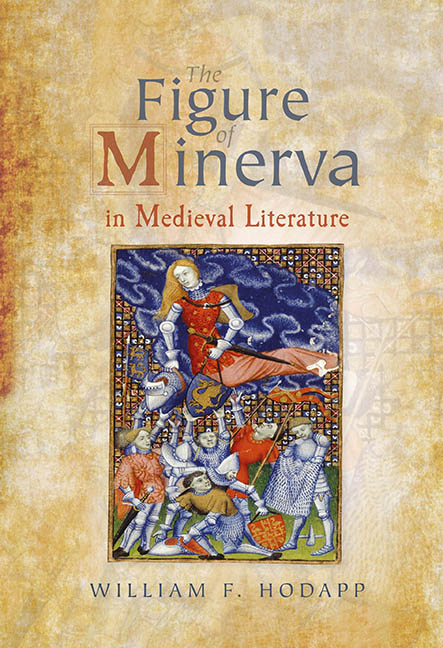Book contents
- Frontmatter
- Dedication
- Contents
- Illustrations
- Acknowledgements
- Abbreviations
- Introduction
- 1 The Roman Minerva and Elements of Medieval Classicism
- 2 The Sapiential Tradition: Minerva as Redemptress
- 3 The Martianus Tradition: Minerva as Mistress of the Liberal Arts
- 4 The Patrona Tradition: Minerva as Protectress and Benefactor
- 5 The Patristic Tradition: Minerva as Idol
- 6 The Ovidian Tradition: Minerva as Venus’ Ally
- Conclusion
- Bibliography
- Index
6 - The Ovidian Tradition: Minerva as Venus’ Ally
Published online by Cambridge University Press: 17 October 2019
- Frontmatter
- Dedication
- Contents
- Illustrations
- Acknowledgements
- Abbreviations
- Introduction
- 1 The Roman Minerva and Elements of Medieval Classicism
- 2 The Sapiential Tradition: Minerva as Redemptress
- 3 The Martianus Tradition: Minerva as Mistress of the Liberal Arts
- 4 The Patrona Tradition: Minerva as Protectress and Benefactor
- 5 The Patristic Tradition: Minerva as Idol
- 6 The Ovidian Tradition: Minerva as Venus’ Ally
- Conclusion
- Bibliography
- Index
Summary
Mutual indifference if not outright conflict tends to characterize the relationship between Athena-Minerva and Aphrodite-Venus in Greco-Roman literature. In Homer's Iliad 5.1–430, for instance, Athena as patrona principis directly inspired Diomedes, granting power to distinguish deities from men and commanding him to avoid fighting the former – except Aphrodite. When he saw the goddess of love rescue her son Aeneas, Diomedes as Athena's agent wounded Aphrodite's wrist, causing her to drop Aeneas, bleed ichor, and flee the field. The goddess of wisdom subsequently mocked Aphrodite on Olympus, prompting Zeus to remind the goddess of love to stick to what she knows and leave warfare to Ares and Athena. Homeric Hymn 5, 8–32, underscores their opposition when the poet includes Athena among the three goddesses (including Artemis and Hestia) whom Aphrodite cannot conquer. Hymns 10 and 11 similarly express fundamental distinctions: while 10 praises Aphrodite's honeyed gifts, 11 celebrates Athena patrona urbis and war goddess. Athena's aversion to Aphrodite's realm is particularly evident in Apollodorus’ first-century BCE account of Erichthonius’ birth. Their conflict, based on their distinctive arenas of action, is perhaps clearest at the Judgment of Paris, which led to Troy's destruction and the Trojan diaspora. Medieval writers, too, take up this theme of conflict, but they also treat another less prevalent theme of alliance where Minerva serves Venus in the latter's work of promoting love. Considering the patristic tradition, this mythological theme of alliance between the goddesses perhaps seems simply an extension of their roles as idols. Yet, while Minerva's role as idol comes from early Christian culture, her alliance with Venus derives from classical antiquity, particularly Ovid. In this chapter, I explore the contrasting themes of tension and union between these two goddesses evident in Ovid and the medieval Ovidian tradition. In many respects, the medieval Ovidian tradition of Minerva imagery draws on the four other traditions explicated thus far. When allied with Venus, Minerva can represent, in Clanvowe's terms, “wisdom of the spirit” as she does in the sapiential, Martianus, and patrona traditions; she can also represent “wisdom of the flessh” as she does in the patristic tradition. Interpretation of any given instance, then, depends on assessing both the goddess’ relationship to Venus and her means and ends. Following Horace (65–8 BCE), medieval writers wanted to entertain and instruct their audiences.
- Type
- Chapter
- Information
- The Figure of Minerva in Medieval Literature , pp. 203 - 246Publisher: Boydell & BrewerPrint publication year: 2019



